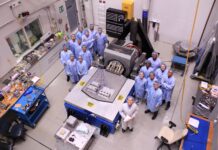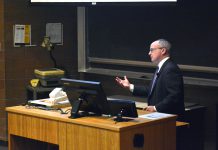An unexpected spin master, Viktor Grabovskyy knows a thing or two about spitting pitches. The UW computer science and business double degree student successfully pitched his idea for a reinvention of the spinning top to the CBC entrepreneurship TV programme, Dragon’s Den. His company, ForeverSpin, was offered $300,000 in exchange for a 20 per cent stake by Dragon Michael Wekerle — Grabovskyy later declined the deal.
ForeverSpin started as a crowdfunding campaign in February 2014 that raised $130,000, followed by subsequent campaigns that raised over $500,000. Part of the appeal comes from spinning tops being “a combination of nostalgia and magic,” Grabovskyy explained.
“It’s actually the first toy I ever remember playing with,” he said. “That was actually the same experience that all of my partners had.”
While spinning tops have a long history as childhood toys — the most notable incarnation for the millennial generation being the Beyblade — ForeverSpin focused on bringing a level of customization for both young and old.
“There is such a variety in weights and in colours. There’s a perfect top for children, for instance. The lighter the top is, the easier it is to spin. For children, that is the top that you’d want to introduce them to,” Grabovskyy explained. “Then there’s … a top made out of stainless steel which is gold-plated on top … so you can attribute your personal qualities, your attitude, your behaviour or your interests [to these tops].”
“One of our customers [is] an investment banker and he has several people working underneath him … and his time is very precious. So when his employees come in to meet him, they have to spin our spinning top and however long it’s spinning for, that’s how long they have to talk,” he said.
Grabovskyy took his tops to the Dragons in April 2015 in search of a mentoring relationship.
“I remember rehearsing the introduction of my pitch at least 100 times, maybe a thousand times, just the first two minutes, making sure it’s perfect. And getting into the building, I started to get nervous. There [were] a few things that the producers did to help me, but there [were] also a few things that the producers did to sabotage my pitch … during that the level of anxiety kept pushing up and up.
“I went in there and the first 60 seconds went quite well … The Dragons began asking me questions and at that point I realized that ‘Hey, I’m in the Den, I’m pitching a product that I know will make the Dragons money, that’s already very successful, that’s got sales, and with that, I regained my composure. From there on it was very fluid. The Dragons were genuinely interested and they loved hearing and seeing what I’ve done,” Grabovskyy said.
Despite Grabovskyy having reached a deal with Wekerle on the show, the deal didn’t go through due diligence.
“First and foremost, we just wanted to meet with him. We wanted to meet with him and really have a much more thorough exploratory session that would also encompass other areas of our business … I was speaking with his business manager and they were adamant that we provide them documentation [first],” he said. “There’s a lot more information that we wanted to bring to them. And again, they were adamant on getting the paperwork first and we decided to find investments elsewhere.”
The setback isn’t holding Grabovskyy back from further interactions with Wekerle. “There’s a … seminar here which I’m going to [Jan. 28] and he’s the keynote speaker. I anticipate speaking with him then,” he said.
For any other students looking to pitch their venture to the Dragons, Grabovskyy has tips on building the perfect pitch.
“There are a few things that will dictate you being able to appear on Dragon’s Den. First and foremost, how TV-friendly you are, because, at the end of the day, the Den is a TV show … it’s not about the investment, but rather the viewership and inspiring entrepreneurs,” Grabovskyy said. For example, he cites beer as not being a TV-friendly product.
“The second is, have you made money? Make sure it’s feasible … aside from appearing on the show, you don’t want the Dragons to let you on the show and then tear you apart. And last is how charismatic you are and if you’re able to present well or to communicate well with the producer … if you’re able to communicate well, then you have a much better chance.”
In particular, Grabovskyy warns against getting your message “lost in translation.”
“The show showed a seven-and-a-half, eight minute segment, when in reality I was pitching to them for 35 minutes. So there’s a lot of information lost in translation, in editing, [and] in post-production, which is fine, but there was a lot of information that the average viewer might have missed,” he said.
All things considered, Grabovskyy credits his studies at UW as being influential in building ForeverSpin.
“Definitely, the programs here in Waterloo, they’re excellent. The computer science professors I’ve had, the community, the individuals that I’ve met with, everyone is just so incredibly inspiring to me and to my partners as well … the biggest thing about Waterloo [is that it’s taught me] how to problem solve.
“So there’s a lot I have to thank Waterloo [for], it’s a choice that I would make again and again. I’m very happy with where I ended up going to university,” he said.
As for the future of ForeverSpin, Grabovskyy is working on expanding the collection of spinning tops into elementary and secondary schools in Canada.
“There’s a lot of projects that I’ll never forget [having done] and that’s something that we can hope to bring to schools.”
This article has been edited to remove the names of the partners, as they are no longer involved with this venture.


































